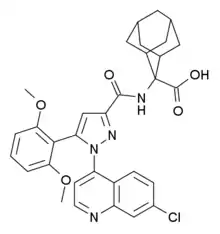Meclinertant
Meclinertant (SR-48692) is a drug which acts as a selective, non-peptide antagonist at the neurotensin receptor NTS1, and was the first non-peptide antagonist developed for this receptor.[1][2] It is used in scientific research to explore the interaction between neurotensin and other neurotransmitters in the brain,[3][4][5][6][7][8] and produces anxiolytic, anti-addictive and memory-impairing effects in animal studies.[9][10][11][12]
 | |
| Identifiers | |
|---|---|
IUPAC name
| |
| CAS Number | |
| PubChem CID | |
| IUPHAR/BPS | |
| UNII | |
| ChEMBL | |
| CompTox Dashboard (EPA) | |
| Chemical and physical data | |
| Formula | C32H31ClN4O5 |
| Molar mass | 587.064 g·mol−1 |
| 3D model (JSmol) | |
SMILES
| |
| (verify) | |
References
- Gully D, Canton M, Boigegrain R, Jeanjean F, Molimard JC, Poncelet M, Gueudet C, Heaulme M, Leyris R, Brouard A (January 1993). "Biochemical and pharmacological profile of a potent and selective nonpeptide antagonist of the neurotensin receptor". Proceedings of the National Academy of Sciences of the United States of America. 90 (1): 65–9. doi:10.1073/pnas.90.1.65. PMC 45600. PMID 8380498.
- Gully D, Jeanjean F, Poncelet M, Steinberg R, Soubrié P, Le Fur G, Maffrand JP (1995). "Neuropharmacological profile of non-peptide neurotensin antagonists". Fundamental & Clinical Pharmacology. 9 (6): 513–21. doi:10.1111/j.1472-8206.1995.tb00528.x. PMID 8808171. S2CID 44422375.
- Rostene W, Azzi M, Boudin H, Lepee I, Souaze F, Mendez-Ubach M, Betancur C, Gully D (April 1997). "Use of nonpeptide antagonists to explore the physiological roles of neurotensin. Focus on brain neurotensin/dopamine interactions". Annals of the New York Academy of Sciences. 814: 125–41. doi:10.1111/j.1749-6632.1997.tb46151.x. PMID 9160965. S2CID 2568079.
- Jolas T, Aghajanian GK (August 1997). "Neurotensin and the serotonergic system". Progress in Neurobiology. 52 (6): 455–68. doi:10.1016/S0301-0082(97)00025-7. PMID 9316156. S2CID 9440522.
- Dobner PR, Deutch AY, Fadel J (June 2003). "Neurotensin: dual roles in psychostimulant and antipsychotic drug responses". Life Sciences. 73 (6): 801–11. doi:10.1016/S0024-3205(03)00411-9. PMID 12801600.
- Chen L, Yung KK, Yung WH (September 2006). "Neurotensin selectively facilitates glutamatergic transmission in globus pallidus". Neuroscience. 141 (4): 1871–8. doi:10.1016/j.neuroscience.2006.05.049. PMID 16814931. S2CID 45391778.
- Petkova-Kirova P, Rakovska A, Della Corte L, Zaekova G, Radomirov R, Mayer A (September 2008). "Neurotensin modulation of acetylcholine, GABA, and aspartate release from rat prefrontal cortex studied in vivo with microdialysis". Brain Research Bulletin. 77 (2–3): 129–35. doi:10.1016/j.brainresbull.2008.04.003. PMID 18721670. S2CID 771749.
- Petkova-Kirova P, Rakovska A, Zaekova G, Ballini C, Corte LD, Radomirov R, Vágvölgyi A (December 2008). "Stimulation by neurotensin of dopamine and 5-hydroxytryptamine (5-HT) release from rat prefrontal cortex: possible role of NTR1 receptors in neuropsychiatric disorders". Neurochemistry International. 53 (6–8): 355–61. doi:10.1016/j.neuint.2008.08.010. PMID 18835308. S2CID 31584847.
- Griebel G, Moindrot N, Aliaga C, Simiand J, Soubrié P (December 2001). "Characterization of the profile of neurokinin-2 and neurotensin receptor antagonists in the mouse defense test battery". Neuroscience and Biobehavioral Reviews. 25 (7–8): 619–26. doi:10.1016/S0149-7634(01)00045-8. PMID 11801287. S2CID 40409029.
- Tirado-Santiago G, Lázaro-Muñoz G, Rodríguez-González V, Maldonado-Vlaar CS (October 2006). "Microinfusions of neurotensin antagonist SR 48692 within the nucleus accumbens core impair spatial learning in rats". Behavioral Neuroscience. 120 (5): 1093–102. doi:10.1037/0735-7044.120.5.1093. PMID 17014260.
- Felszeghy K, Espinosa JM, Scarna H, Bérod A, Rostène W, Pélaprat D (December 2007). "Neurotensin receptor antagonist administered during cocaine withdrawal decreases locomotor sensitization and conditioned place preference". Neuropsychopharmacology. 32 (12): 2601–10. doi:10.1038/sj.npp.1301382. PMC 2992550. PMID 17356568.
- Lévesque K, Lamarche C, Rompré PP (October 2008). "Evidence for a role of endogenous neurotensin in the development of sensitization to the locomotor stimulant effect of morphine". European Journal of Pharmacology. 594 (1–3): 132–8. doi:10.1016/j.ejphar.2008.07.048. PMID 18706409.
This article is issued from Wikipedia. The text is licensed under Creative Commons - Attribution - Sharealike. Additional terms may apply for the media files.